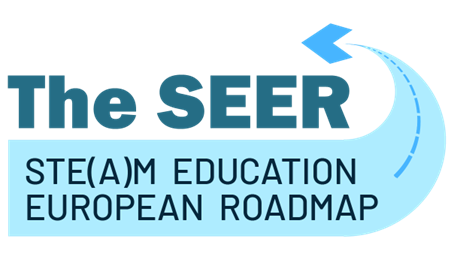The STE(A)M Education European Roadmap project
ICSE is part of the The STE(A)M Education European Roadmap project (the SEER) that started in September 2022 and is funded by EU.
STE(A)M is linking some or all of the STEM subjects (Science, Technology, Engineering and Mathematics) to All (A) other disciplines, including Arts, with real-world problems. Despite this approach having the potential to encouraging more interest in STEM and increasing uptake of STEM careers, we can observe only fragmented implementation of it.
The SEER project will develop a set of roadmaps for stakeholders of STEM education. The roadmaps will outline the different paths of supporting students in STE(A)M on all education levels and show the way of mainstreaming of STE(A)M education in Europe. In order to do that, the project partners (European Schoolnet in Belgium, the National Institute for Documentation, Innovation and Educational Research in Italy, University of Cyprus in Cyprus, Hellenic Open University in Greece, Platform Science and Technology in the Netherlands and ICSE) will collect and analyse existing initiatives, policies and practices by bringing them together with the needs of teachers, school decision-makers, industry and policy makers. After defining the gaps and ruptures in STE(A)M education continuum, a set of milestones and strategies for overcoming them will be produced for key stakeholders.
After the first kick-off meeting and following bi-weekly meetings partners have demonstrated a very enthusiastic involvement in the project. Besides agreeing upon timelines of the different deliverables and how the project consortium can support each other, the opportunities that SEER presents have been discussed, and the planned tasks have been brought to an advanced level.
One part of the project is dedicated to analyzing current trends in European STEM-education policy. To this end, all STEM education projects listed in the Scientix-repository were examined. Initial results show that in most projects, teaching or learning materials are being produced, with the most popular topics being sustainability, digitalization, gender diversity, integrated STEM, and STEM careers.

However, the study also revealed that finding these materials can be challenging if the project names are not known. Additionally, the quality and effectiveness of the projects, such as through appropriate accompanying research, are hardly evaluated. Many project contents are no longer accessible after the project ends.
Surprisingly, themes such as cultural diversity, inclusion, and improving self-efficacy in STEM education play only a minor role, even though they are active areas of current STEM education research. The complete results of the study will be published shortly.
